Freeze-drying, also known as sublimation and lyophilisation, is one of the most important methods for preserving food. But what exactly does freeze-drying mean? It refers to a process in which the water is removed from frozen food without first thawing it. In this way, the cells of the fruit remain intact. They retain their shape and colour far better than with conventional drying methods, such as drying in the oven. Vitamins and other valuable ingredients are also preserved thanks to sulimation. Freeze-dried products can be stored for years. The trick: If you add water or other liquids, their original aroma comes out again.
Table of contents
Freeze-dried food: almost like fresh
Freeze-dried products are ideal for a wholesome diet. They come very close to fresh products in terms of valuable ingredients. Freeze-dried foods are particularly convincing in comparison to dried fruits or canned foods: they are more or less like fresh fruit and vegetables, only without water. The large selection of such fruit and vegetables makes it possible to create a wide variety of dishes and snacks. Be it sweet, crunchy or savoury – with freeze-drying, simply anything goes.
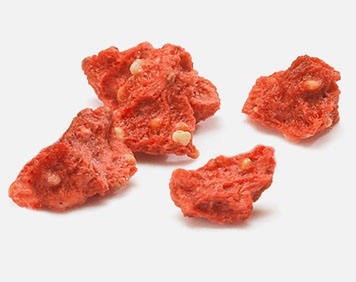
Freeze-drying for the end consumer
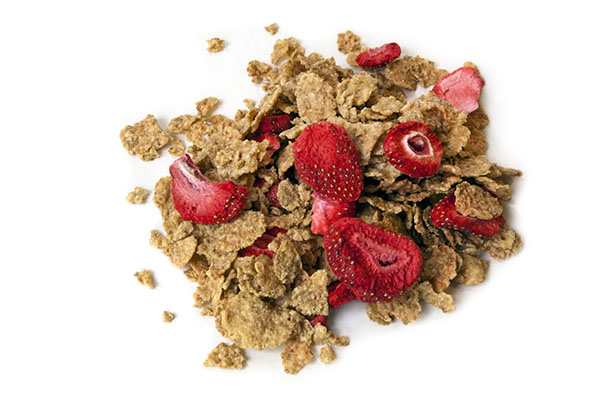
These foods can be stored for years in suitable packaging. As a result, freeze-dried foods are increasingly available in the kitchens of end consumers; for example, for the preparation of muesli,s desserts or cakes.
Fuelled by the trend of superfoods and health-conscious nutrition, supermarkets and health food stores continue to expand their range of freeze-dried fruits and vegetables. Retailers also appreciate their long minimum shelf life. But it is not only in local supermarkets that freeze-dried foods are playing an increasingly important role; online shops are also taking advantage of the long minimum shelf life and low shipping weight.
In addition, they save space due to their low weight and can be shipped in a CO2-saving way. Local and online traders offer exotic fruits and vegetables, such as mango, passion fruit, dragon fruit or coconut chips, in addition to local fruits. The light weight of the delicious lightweights are further advantages of freeze-dried foods. This makes them ideal for on the go, especially for outdoor activities such as hiking or cycling tours.
How does freeze-drying work?
Freeze-drying has been a tried and tested process for a long time. As early as 1890, anatomy professor Richard Altmann carried out the first freeze-drying according to the modern definition. In this process, the water is gently removed from frozen food by means of negative pressure. A typical freeze-drying plant has two chambers for this purpose, which are connected by a valve.
- In the first step, employees of the plant fill the food into suitable containers. Fruit and vegetables are usually 1 or 2 cm high in trays.
- In the first step, employees of the plant fill the food into suitable containers. Fruit and vegetables are usually 1 or 2 cm high in trays.
- The second chamber is cooled down to an even lower temperature - around -60 °C by a condenser coil.
- In addition, a compressor sucks the air out of the second chamber so that a vacuum is created there.
- This draws most of the moisture from the first chamber into the second. It is deposited as ice on the condenser spiral. This phase is called primary drying.
- The spiral is then heated to a temperature well above freezing point. During this so-called secondary drying, further moisture evaporates from the dry material.
- At the end of the whole process, only a small amount of residual moisture remains in the finished product.
- Afterwards, the product is packed in an airtight container. Protected in this way, freeze-dried fruit and vegetables can be kept for years.
Types of freeze-dried foods
Thanks to their usually high water content, fruits in particular are suitable for freeze-drying. This gentle form of preservation largely preserves the taste, colour, shape and ingredients of the fruit. All common berries are offered freeze-dried – for example strawberries, raspberries, cranberries and currants. Pineapples, bananas and apples are also in high demand. Even fruit juices can be turned into concentrated, dry powder with this process.
The same applies to vegetables as to fruit: what contains a lot of water can be freeze-dried. For example, peppers, beetroot, beans, peas, leeks, spinach, potatoes, onions and many other vegetables are available. Companies in the food industry make use of a wide range of freeze-dried vegetables for their production. But this does not complete the range of dryable foods: Meat, fish and seafood are also suitable for freeze-drying. It even works for eggs: from egg yolks to egg whites to already processed egg products such as omelettes.
Another popular product for this process is coffee. This is freeze-dried in large quantities and offered as so-called “instant coffee”. This type of coffee illustrates the excellent solubility of freeze-dried food. The reason for this is their porous structure. When water or other liquids are added, such foods effortlessly regain their original shape and colour. It is the same with dairy products. Milk can be dehydrated just as easily as coffee. All dairy products can be preserved in this way, including various types of cheese and yoghurt.
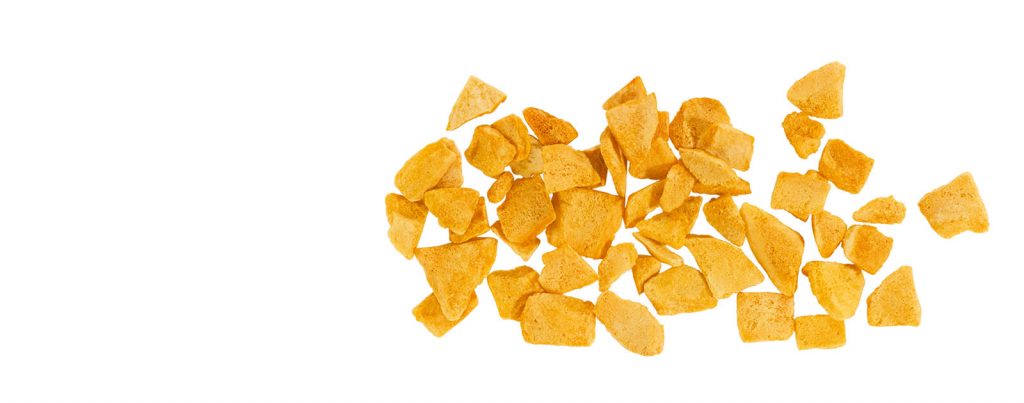
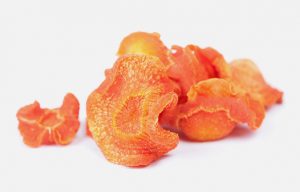
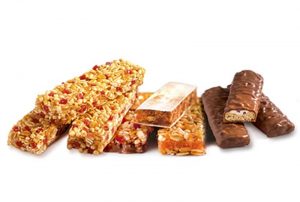
Industrial applications
Foods treated by sublimation can be divided into two categories according to their use:
1. category: For immediate consumption: freeze-dried fruit is often offered as a snack, for example strawberries and banana or coconut chips. The popular instant coffee, beef jerky and vegetable crisps also fall into the “direct consumption” category.
2nd category: For further processing and product refinement: many food processing companies use freeze-dried fruits, vegetables or animal products as ingredients for their products. For example, for yoghurt, oat flakes, muesli or ready-made soups. They can also be used to enhance the taste of baked goods.
Freeze-dried fruits are also often coated with chocolate and offered as confectionery. Fruit preserved in this way is suitable, for example, as a snack or for use in dairy products such as fruit yoghurt, milk puddings and drinks. Freeze-dried fruit is also excellent for the production of baked goods or various desserts.
Freeze-dried vegetables are also suitable for refining soups and sauces. In addition, companies use them as an essential ingredient in instant soups and instant sauces. Here, too, the pre-products treated in this way benefit from their good solubility. Such instant soups can contain, for example, vegetables, meat, noodles and vegetables in any desired recipe. The same applies to instant sauces.
The quality of all these products is recognisably higher than those made with conventionally dried ingredients.
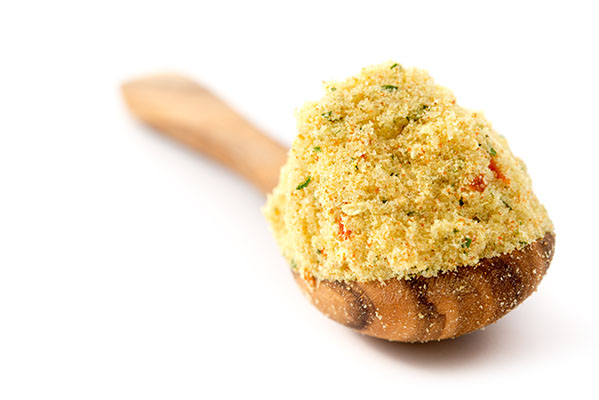
Advantages for the food industry

It is no longer possible to imagine the food industry without freeze-dried fruit and vegetables. Their central advantage: year-round availability, regardless of the harvest season. The second advantage is the consistently high and uniform quality of the products. Manufacturers do not need to worry about quality fluctuations with these preliminary products.
Other popular applications
Besides its use in convenience foods, there are some interesting niche applications for freeze-drying. For these, in addition to long shelf life, low weight and volume are important. These include military rations for situations where supplies from packaged daily rations or mobile kitchens are not practical. The use is very similar for backpacking, trekking or mountaineering: for these applications it helps immensely if a meal does not weigh much and takes up little space in the backpack. Freeze-dried products are also a valuable addition to civil defence food reserves. Finally, there is an exclusive application where every gram counts: manned space flight. These examples show how large the field of application for freeze-dried food is.
Conclusion
Freeze-dried foods are becoming increasingly popular with both the end consumer and food companies. In addition, freeze-dried fruits, vegetables or animal products offer numerous possibilities for further processing. Visual appeal is extremely important to consumers – the more natural their food looks, the better. Furthermore, consumers want to eat healthier. This has spurred the development of healthier alternatives for the confectionery market – often in combination with ingredients that contain less sugar, are “healthier”, more functional and tastier – all attributes that freeze-dried products fulfil.
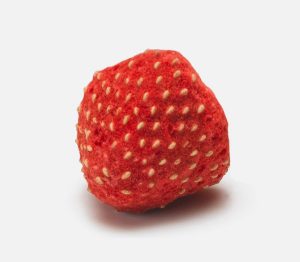
Arrange a consultation now:
Do you have any questions, suggestions or would you like to make an enquiry? We will be happy to help you.
Paradiesfrucht GmbH
Bergener Strasse 10
29410 Salzwedel
Germany
[email protected]
Tel. +49 4148 615 111 +49 3901 307 900

Kurt Jahncke
Director

Bernd Wiesner
Director


